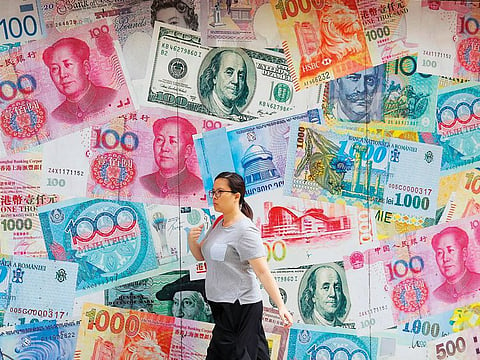Hong Kong stocks slump most in Asia, Yuan falls to 11-year low
The yuan slid 0.7% to 7.1448 per dollar

Hong Kong stocks tumbled the most in Asia and the yuan weakened to an 11-year low amid concern over the intensifying trade war.
The Hang Seng Index dropped 2.9% at 1:41 p.m. in Hong Kong. Meat producer WH Group Ltd. and Cnooc Ltd. were among the worst performers. The yuan slid 0.7% to 7.1448 per dollar, while the Shanghai Composite Index dropped 1.2%.
China said Friday it would impose retaliatory tariffs on another $75 billion of U.S. goods. President Donald Trump responded by announcing additional levies on Chinese imports. He also called for American companies to pull out of Asia’s largest economy. Vice Premier Liu He said China “firmly opposes” the U.S. escalation of the trade war, Caixin reported on Monday.
Adding to the risk-off sentiment, Hong Kong police and protesters clashed for a 12th weekend and China sent the strongest warning yet it’s thinking of using troops on the city’s streets.
‘I don’t see an end to the current downturn cycle in Hong Kong stocks,’ said Ben Kwong, executive director at KGI Asia Ltd. ‘Hong Kong is leading declines today because it’s got both domestic and external problems.’
The offshore yuan was down 0.5% at 7.1692, after falling as much as 0.86% earlier to a record low. The central bank set its daily fixing at 7.0570 on Monday, stronger than analysts expected. The onshore yuan has dropped 1.7% in an eight-session losing streak.
‘The gloves are coming off on both sides and as such yuan depreciation is an obvious cushion against US tariffs,’ said Mitul Kotecha, a senior emerging markets economist at Toronto-Dominion Bank. ‘As long as China can ensure that yuan weakness is well controlled i.e. it does not provoke strong outflows, expect to see further depreciation in the currency.’
The Hang Seng Index headed for its lowest close since Aug. 14. A gauge of the city’s property stocks tumbled 3.3%.
“It’s not only China central government’s authority but also its responsibility to intervene when riots take place in Hong Kong,” the state-run Xinhua News Agency said Sunday in a commentary, drawing on comments by former top leader Deng Xiaoping saying Beijing has to act under such circumstances.
Sign up for the Daily Briefing
Get the latest news and updates straight to your inbox



